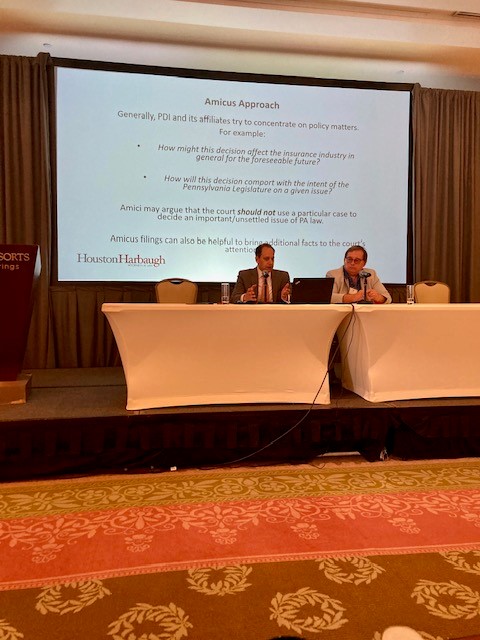Houston Harbaugh Files Pennsylvania Supreme Court Amicus Brief on Behalf of Several Insurance Industry Trade Organizations
On January 27, 2023, Houston Harbaugh attorneys Christopher M. Jacobs and Tricia A. Martino of the firm’s insurance coverage and bad faith practice group submitted an amicus brief on behalf of the Pennsylvania Defense Institute, the Insurance Federation of Pennsylvania, Inc. and the Pennsylvania Association of Mutual Insurance Companies in the case of Kramer v. Nationwide Prop. and Cas. Ins. Co. in relation to the question of whether “emotional distress damages are covered under an insurance policy providing liability coverage only for ‘bodily injury,’ even when the policy itself excludes emotional distress from the definition of bodily injury[.]”
The Kramer case is a declaratory judgment action seeking to resolve the question whether Nationwide is required to defend homeowners against a wrongful death and survival action claim filed against them. The wrongful death and survival action sought to recover for the death of Michael T. Murphy, Jr. at the homeowners’ residence when Mr. Murphy overdosed on fentanyl, heroin, and benzodiazepines. Nationwide denied the homeowners’ claim for a defense pursuant to an exclusion for bodily injury “resulting from the use… by a person of a controlled substance….” (“controlled substances exclusion”). The trial court ruled on summary judgment that Nationwide had a duty to defend because the policy’s controlled substances exclusion was not implicated. On appeal, the Superior Court found that the controlled substances exclusion applied, but adopted an argument not raised or briefed by the parties—that is: (a) the wrongful death damages asserted in the underlying complaint included claims for emotional distress by the wrongful death beneficiaries; and (b) those emotional distress damages did not qualify as “bodily injury” within the meaning of the Nationwide policy. The Superior Court concluded that because the policy’s controlled substances exclusion applies only to “bodily injury,” the underlying complaint alleged a potentially covered claim such that Nationwide had a duty to defend.
The Superior Court decision, however, did not address the insuring agreement contained in the Nationwide policy, which granted coverage only for liability for “bodily injury” or “property damage” caused by accidental conduct. In this regard, the Nationwide policy contained a customized definition of “bodily injury” that defined the term as “bodily harm, including resulting care, sickness or disease, loss of services or death” and expressly provided that “[b]odily injury does not include emotional distress, mental anguish, humiliation, mental distress or injury, or any similar injury unless the direct result of bodily harm.” As such, while the Superior Court found that the emotional distress it identified (that is, the emotional distress of the wrongful death beneficiaries) did not constitute “bodily injury” under the Nationwide policy, it did not explain why an injury that did not qualify as “bodily injury” could be potentially covered under the Nationwide policy.
In its briefing on behalf of the amici, Houston Harbaugh argued that:
- Homeowners insurers are free to remove emotional distress from their definitions of “bodily injury” where such policies are not highly regulated by legislation or judicial decisions. As there is no public policy basis to compel insurers to cover emotional distress damages as “bodily injury,” policies such as the one at issue—i.e., which expressly excludes emotional distress from its definition of “bodily injury”—should be interpreted and enforced as written.
- The Pennsylvania Supreme Court should exercise restraint and recognize that this is not a case for the Court to address the broad issue of whether emotional distress can qualify as “bodily injury” for the purposes of liability insurance coverage, where the definition at issue is not the standard one commonly used in the industry and where the record is inadequate in that the parties neither raised nor briefed the issue. General liability, auto and homeowners insurance policies commonly provide coverage for “bodily injury” liability caused by accidents such that the question of when and whether emotional distress qualifies as “bodily injury” for liability insurance purposes is a significant issue that would impact a broad range of insurers.
- To the extent the Pennsylvania Supreme Court were to address the emotional distress at issue in this matter in relation to the particular policy language in question, the only emotional distress identified by the Superior Court is that suffered by third parties (i.e., wrongful death beneficiaries) who themselves did not sustain any physical harm. The application of the specific Nationwide policy language with respect to these emotional distress damages compels the conclusion that they do not constitute “bodily injury” under this policy.
We will continue to monitor this appeal and report on the Supreme Court’s ruling when the same is issued.
For more information about this issue, please contact Christopher M. Jacobs at jacobscm@hh-law.com or Tricia A. Martino at martinota@hh-law.com.
















